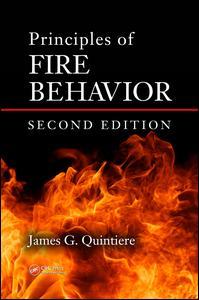Description
Principles of Fire Behavior (2nd Ed.)
Author: Quintiere James G.
Language: English
Subjects for Principles of Fire Behavior:
Keywords
Heat Flux; Combustion; Fire Growth; Laminar Flame Propagation; Turbulent Flame; Smoldering; Premixed Flame; Diffusion Flames; Laminar Flame; Heat Transfer; Pool Fire; Premixed Flames; Radiant Heat Flux; Flame Spread; Piloted Ignition Autoignition; Diffusion Flame; Ignition Time; Energy Release rates; Flame Heat Flux; NFPA Design categories; Energy Release Rate; Vehicle fires; Ignition Temperature; Plumes; Flame Height; Buoyancy and Fluid Dynamics; Smoke Layer; Whirls and Bells; Burning Rate; Combustion products; Critical Heat Flux; Smoke movement; Heat Flux Sensors; Fuel load and burning duration; Equivalence Ratio; Flashover; WTC Tower; Fire safety design; Piloted Ignition; Opposed Flow Flame Spread; Fire Plume; Average Flame Height; Laminar Diffusion Flame
· 15.6x23.4 cm · Hardback
Description
/li>Contents
/li>Readership
/li>Biography
/li>
This text covers the four forms of fire: diffusion flames, smoldering, spontaneous combustion, and premixed flames. Using a quantitative approach, the text introduces the scientific principles of fire behavior, with coverage of heat transfer, ignition, flame spread, fire plumes, and heat flux as a damage variable. Cases, examples, problems, selected color illustrations and review of mathematics help students in fire safety and investigation understand fire from a scientific point of view.
Mathematics Review. Introduction. Combustion. Heat Transfer. Ignition. Flame Spread. Burning Rate. Plumes. Combustion Products. Compartments. Case Studies. Index.
Dr. James Quintiere received his PhD from New York University in 1970, and is currently Professor Emeritus, Department of Fire Protection, at the University of Maryland in College Park. He has over thirty years of experience in fire research and teaching, and has written the popular textbook PRINCIPLES OF FIRE BEHAVIOR, and co-authored ENCLOSURE FIRE DYNAMICS with Bjorn Karlsson. He has investigated numerous fire disasters, including the Branch Davidian Compound fire in Waco, Texas, and the 1986 New Year’s Eve DuPont Plaza fire in Puerto Rico. His testimony during the civil trial on the Waco tragedy was pivotal to the jury’s conclusion that the fires were not the result of federal authorities’ actions. Dr. Quintiere is the author of more than 75 journal publications and reports, and is the past chair, International Association for Fire Safety Science. He is also the recipient of the Department of Commerce Bronze Medal (1976) and Silver Medal (1982).




